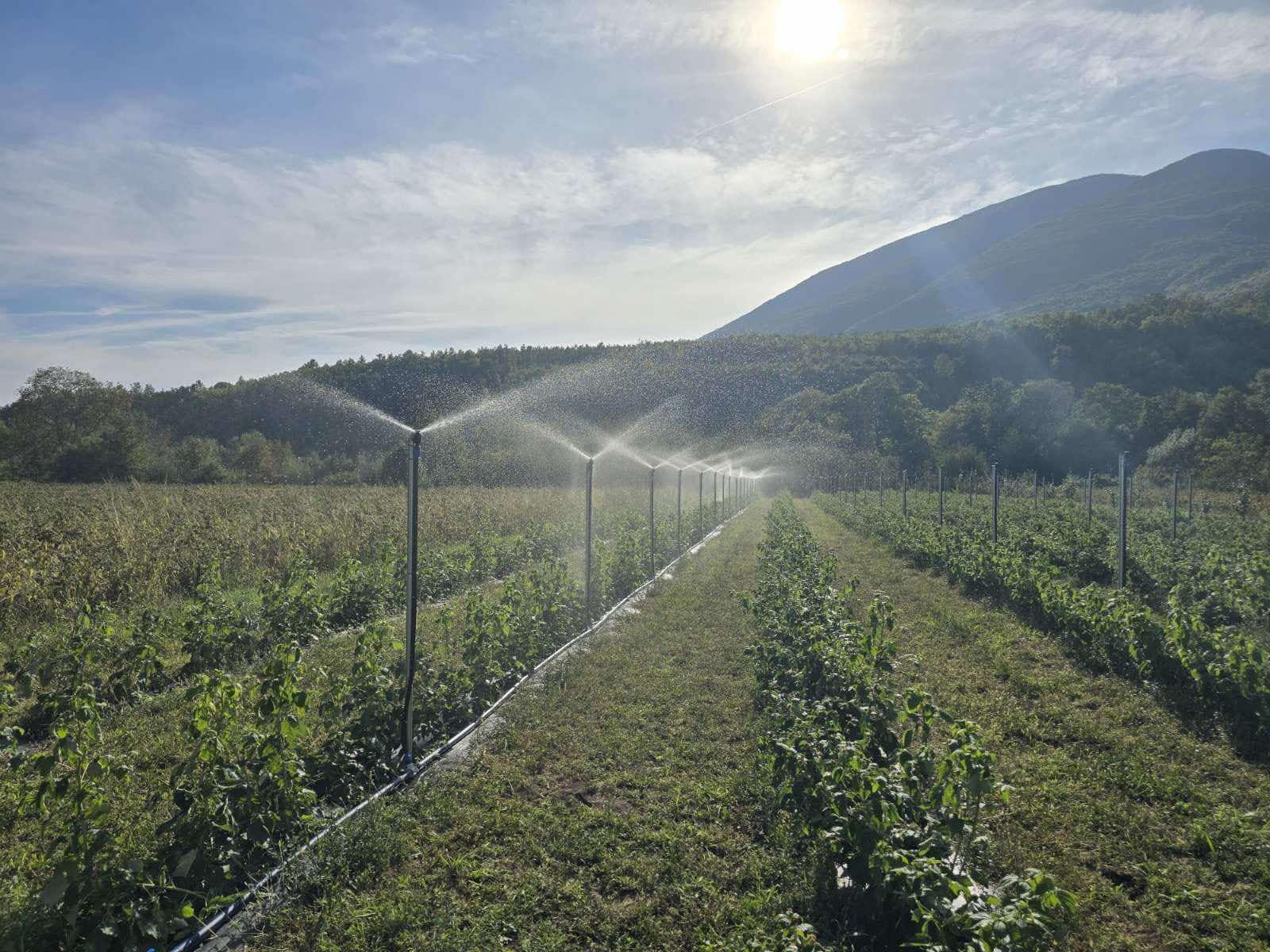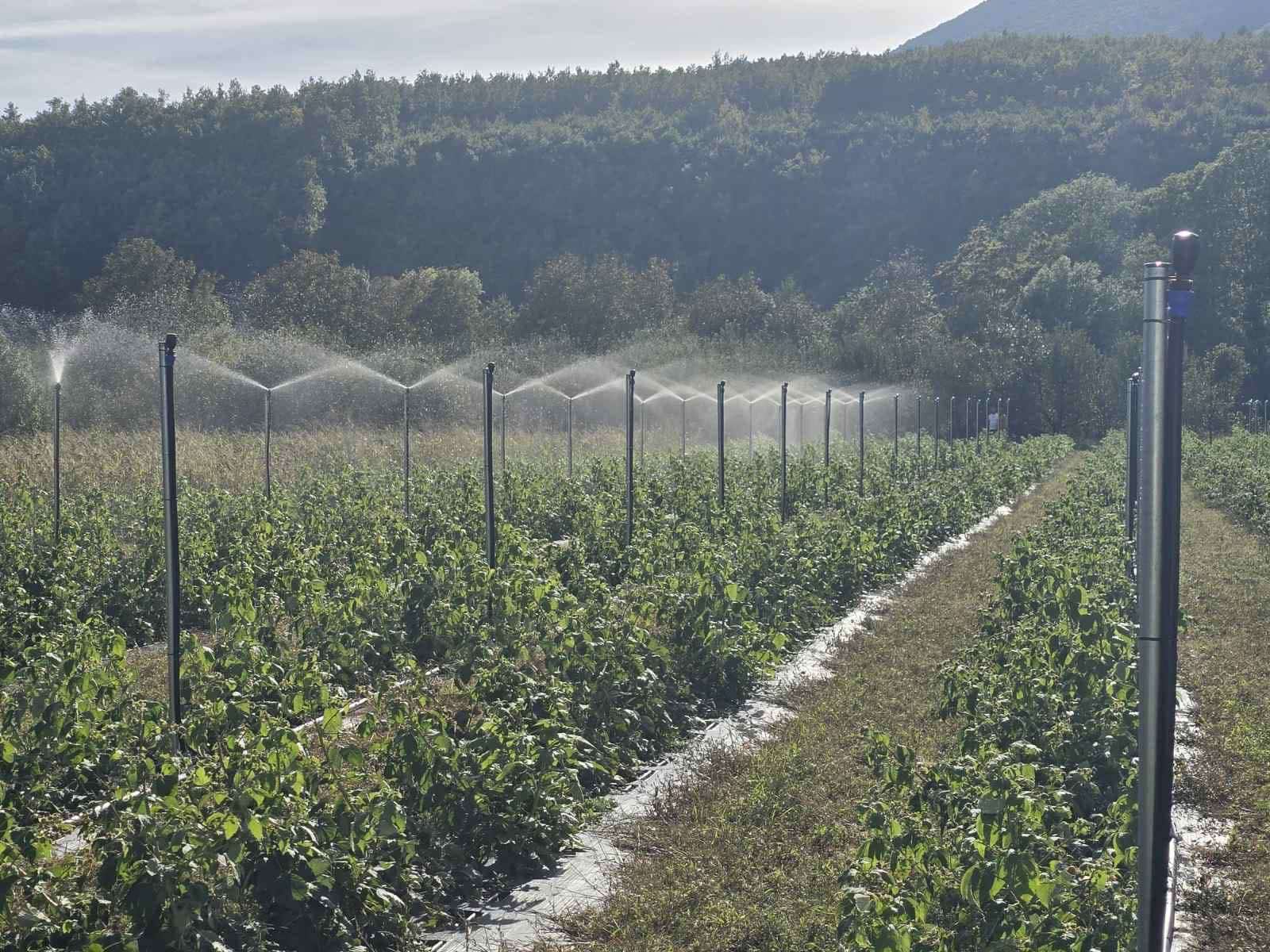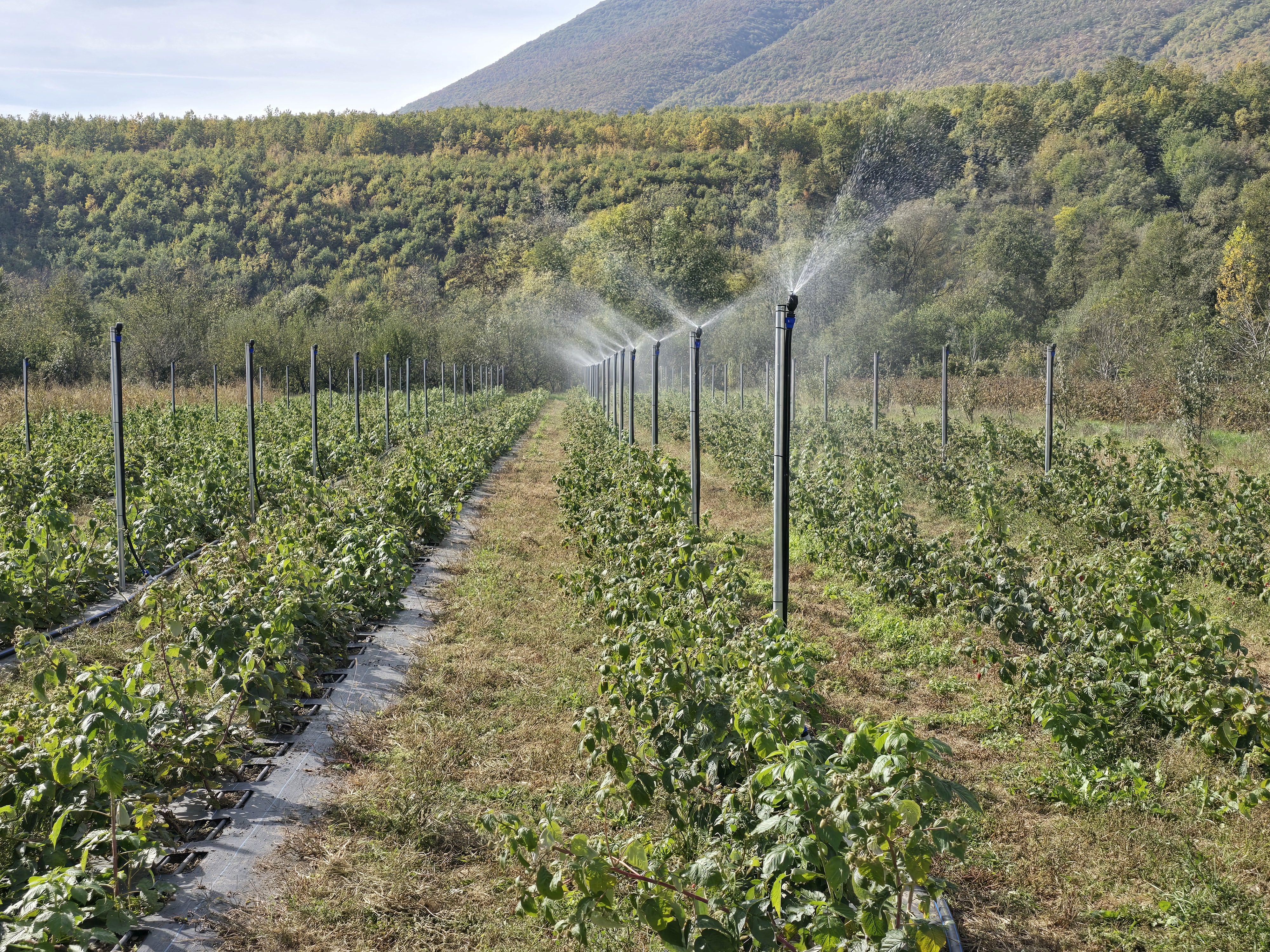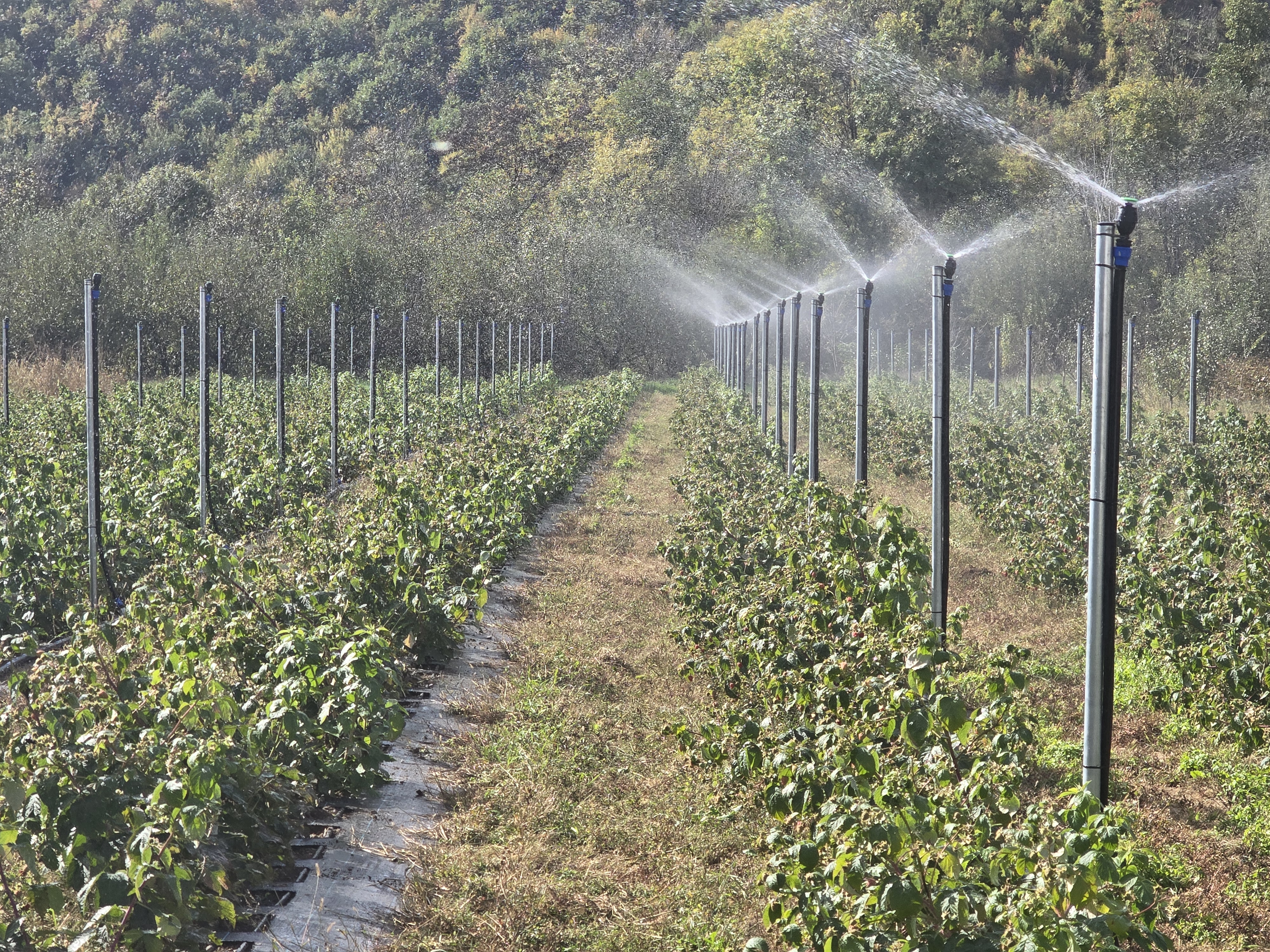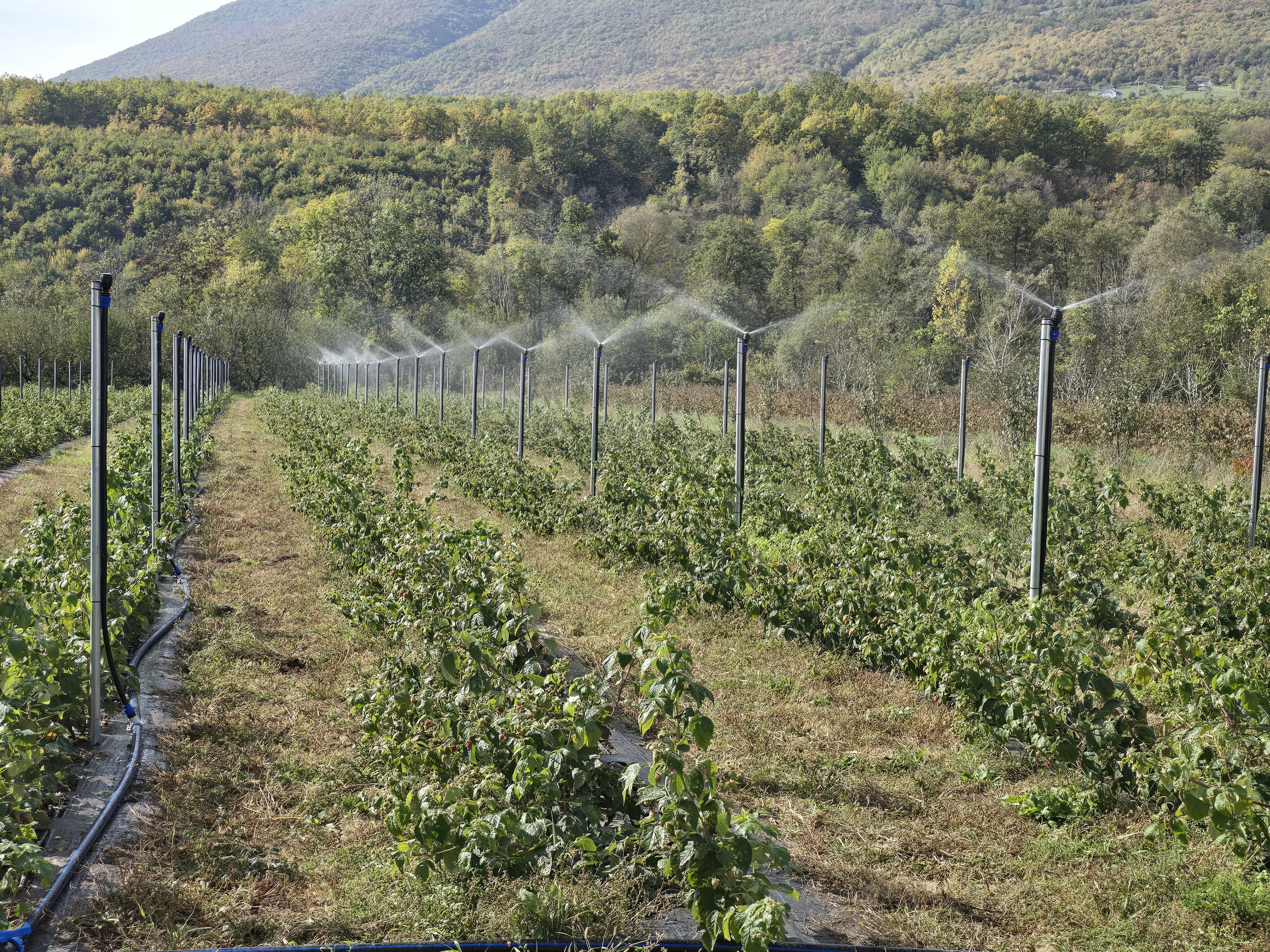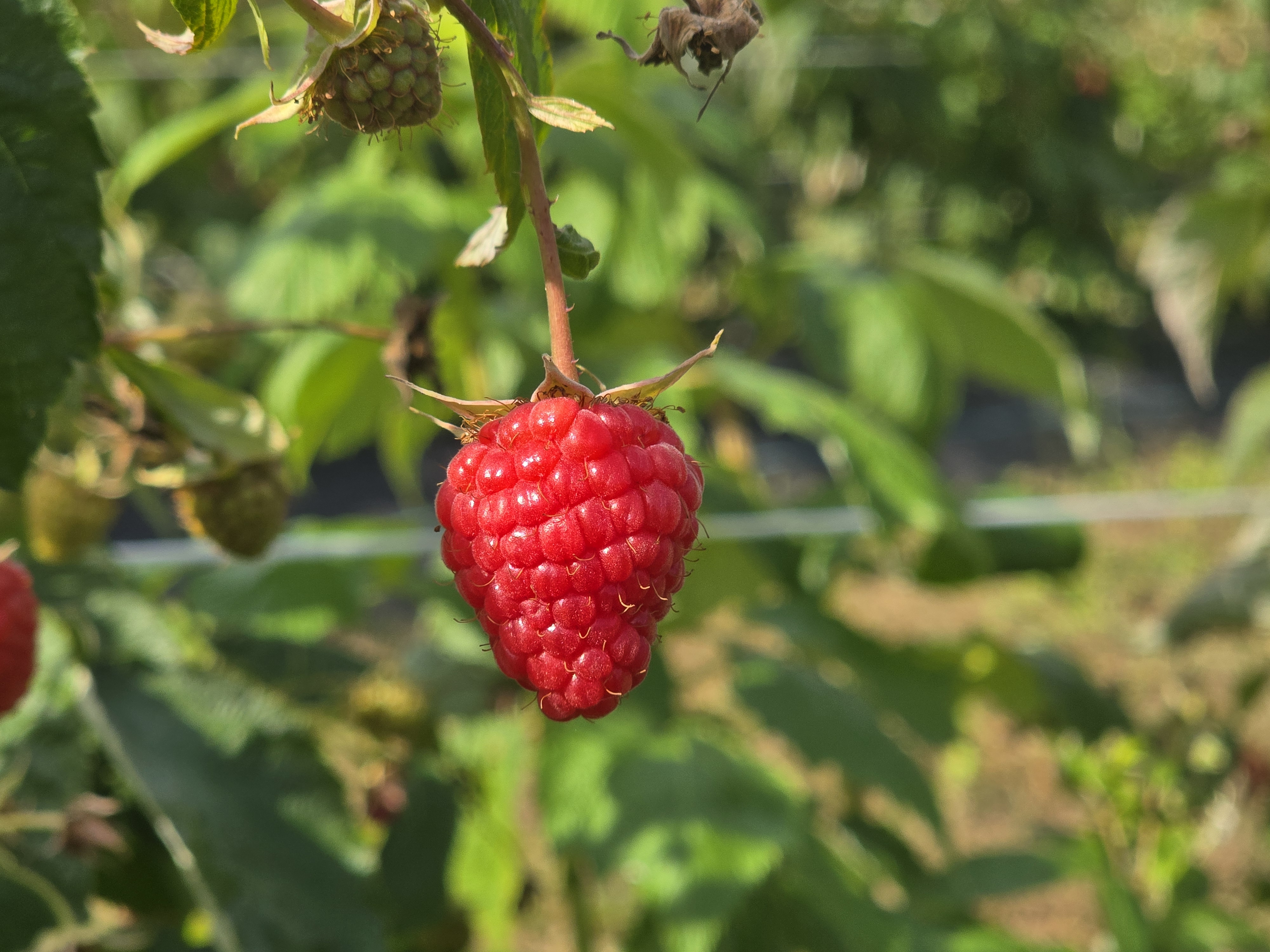Reconnecting with nature
Smart irrigation for resilient berries
Innovative Sprinkler irrigation for climate-resilient raspberry production in Kosovo
High temperatures are threatening raspberry yields in Kosovo. To combat this, "Mjedra e Kosovës" has launched a pilot project installing an innovative sprinkler irrigation system to optimize water use and cool plants. This model aims to boost yields by 30% and improve climate resilience. Valuable data from the project will support broader adoption of sprinkler irrigation, promoting sustainable practices and ensuring a more resilient raspberry sector in the face of climate change.
Kosovo
National
Mainly rural
It refers to a physical transformation of the built environment (hard investment)
Yes
2024-12-10
Yes
Creative Europe
No
Yes
No
Yes
As a representative of an organisation
This project pioneers the adoption of sprinkler irrigation systems to enhance climate resilience in raspberry farming. High temperatures in recent years have significantly reduced yields, threatening the livelihoods of farmers. By introducing an innovative cooling irrigation method, the project aims to mitigate heat stress, optimize water use, and promote sustainable agricultural practices.
The initiative primarily targets raspberry growers and agricultural stakeholders, providing them with a model solution for climate adaptation. A pilot system has been successfully installed.
Aligned with the New European Bauhaus values, the project integrates sustainability, inclusivity, and aesthetics by fostering eco-friendly farming, engaging local communities, and enhancing the landscape through innovative irrigation techniques. It directly addresses territorial challenges, including climate change adaptation and resource-efficient farming, crucial for Kosovo’s agricultural sector.
In the long term, this approach will improve farmers' livelihoods, reduce environmental impact, and ensure food security. By demonstrating the effectiveness of smart irrigation, the project paves the way for scalable, nature-based solutions that empower farmers, protect natural resources, and create a thriving, sustainable agricultural ecosystem in the region.
The initiative primarily targets raspberry growers and agricultural stakeholders, providing them with a model solution for climate adaptation. A pilot system has been successfully installed.
Aligned with the New European Bauhaus values, the project integrates sustainability, inclusivity, and aesthetics by fostering eco-friendly farming, engaging local communities, and enhancing the landscape through innovative irrigation techniques. It directly addresses territorial challenges, including climate change adaptation and resource-efficient farming, crucial for Kosovo’s agricultural sector.
In the long term, this approach will improve farmers' livelihoods, reduce environmental impact, and ensure food security. By demonstrating the effectiveness of smart irrigation, the project paves the way for scalable, nature-based solutions that empower farmers, protect natural resources, and create a thriving, sustainable agricultural ecosystem in the region.
Climate Resilience
Sustainable Agriculture
Water Efficiency
Innovation in Farming
Community Empowerment
Our project exemplifies the three core values of the New European Bauhaus—sustainability, aesthetics, and inclusiveness—by introducing an innovative, environmentally responsible, and socially impactful approach to raspberry farming in Kosovo.
Sustainability is at the heart of this initiative, addressing the growing challenges of climate change through the adoption of sprinkler irrigation systems. These systems optimize water use, reduce the impact of high temperatures, and enhance plant resilience, ultimately improving yields by up to 30%. By promoting resource-efficient irrigation, the project contributes to long-term environmental sustainability while ensuring economic stability for raspberry farmers.
The project also embodies aesthetic and functional design principles, as the sprinkler irrigation system seamlessly integrates into the agricultural landscape, preserving the natural beauty of rural areas while enhancing productivity. The system is designed to blend with existing raspberry orchards, ensuring minimal disruption to the environment and creating a visually harmonious farming model.
In terms of inclusiveness, the project actively engages small-scale farmers, agricultural stakeholders, and local communities in adopting innovative climate adaptation strategies. By providing a scalable model for sustainable farming, the initiative fosters knowledge-sharing and capacity-building, empowering farmers to transition towards climate-smart agriculture. Demonstrations at key industry events, such as Raspberry Day, ensure that insights from the project are widely shared, encouraging widespread adoption of resilient and sustainable practices.
By addressing climate adaptation, resource efficiency, and community engagement, this project serves as a replicable and scalable solution that can inspire similar initiatives across other climate-affected regions in Europe.
Sustainability is at the heart of this initiative, addressing the growing challenges of climate change through the adoption of sprinkler irrigation systems. These systems optimize water use, reduce the impact of high temperatures, and enhance plant resilience, ultimately improving yields by up to 30%. By promoting resource-efficient irrigation, the project contributes to long-term environmental sustainability while ensuring economic stability for raspberry farmers.
The project also embodies aesthetic and functional design principles, as the sprinkler irrigation system seamlessly integrates into the agricultural landscape, preserving the natural beauty of rural areas while enhancing productivity. The system is designed to blend with existing raspberry orchards, ensuring minimal disruption to the environment and creating a visually harmonious farming model.
In terms of inclusiveness, the project actively engages small-scale farmers, agricultural stakeholders, and local communities in adopting innovative climate adaptation strategies. By providing a scalable model for sustainable farming, the initiative fosters knowledge-sharing and capacity-building, empowering farmers to transition towards climate-smart agriculture. Demonstrations at key industry events, such as Raspberry Day, ensure that insights from the project are widely shared, encouraging widespread adoption of resilient and sustainable practices.
By addressing climate adaptation, resource efficiency, and community engagement, this project serves as a replicable and scalable solution that can inspire similar initiatives across other climate-affected regions in Europe.
The project enhances the aesthetics and quality of experience by integrating modern agricultural innovation with the natural beauty of rural landscapes. The sprinkler irrigation system is designed to be efficient yet unobtrusive, preserving the visual harmony of raspberry fields while improving resilience to climate change. This ensures that sustainable farming does not compromise the scenic appeal of agricultural areas but rather enhances it.
A key focus is on creating an engaging and inspiring environment for farmers, visitors, and stakeholders. Raspberry fields, traditionally associated with natural beauty and productivity, are now transformed into demonstration sites where technology and tradition coexist. By implementing a climate-adaptive system that is both functional and visually appealing, the project fosters a new standard of agricultural design—one that respects nature while ensuring productivity.
Moreover, the project promotes cultural and educational experiences through events such as Raspberry Day, where farmers and communities gather to witness firsthand the benefits of sustainable practices. These activities do not only contribute to knowledge-sharing but also create a collective sense of appreciation for innovation in agriculture.
By demonstrating that sustainability and aesthetics can go hand in hand, the project serves as a model for future agricultural initiatives, inspiring other communities to adopt climate-smart and visually appealing farming practices that improve both economic and environmental conditions.
A key focus is on creating an engaging and inspiring environment for farmers, visitors, and stakeholders. Raspberry fields, traditionally associated with natural beauty and productivity, are now transformed into demonstration sites where technology and tradition coexist. By implementing a climate-adaptive system that is both functional and visually appealing, the project fosters a new standard of agricultural design—one that respects nature while ensuring productivity.
Moreover, the project promotes cultural and educational experiences through events such as Raspberry Day, where farmers and communities gather to witness firsthand the benefits of sustainable practices. These activities do not only contribute to knowledge-sharing but also create a collective sense of appreciation for innovation in agriculture.
By demonstrating that sustainability and aesthetics can go hand in hand, the project serves as a model for future agricultural initiatives, inspiring other communities to adopt climate-smart and visually appealing farming practices that improve both economic and environmental conditions.
This project places a strong emphasis on inclusion, accessibility, and affordability, ensuring that small-scale farmers, women, and young entrepreneurs can benefit from sustainable agricultural solutions. By introducing sprinkler irrigation technology, the project reduces the risks associated with climate change, particularly for farmers with limited resources. The system is designed to be cost-effective and easy to implement, making it an accessible solution for a wide range of agricultural communities.
One of the key objectives of the project is capacity building and knowledge transfer. Farmers from different backgrounds, including marginalized and rural communities, are actively engaged in learning about climate-smart agriculture. The project promotes peer-to-peer learning, where best practices are shared through demonstration events.
The initiative also supports gender inclusivity by encouraging the active participation of women in raspberry farming, recognizing their essential role in sustainable agriculture. The affordability of the system allows more women-led farms to integrate modern irrigation techniques, improving productivity and economic independence.
Furthermore, the project fosters collaborative decision-making by involving key stakeholders, including farmers’ associations, research institutions, and policymakers. By aligning with New European Bauhaus principles, the project promotes co-creation, where solutions are designed with direct input from end-users, ensuring that the system is adaptable to their needs.
In the long term, this initiative creates a replicable model for inclusive, sustainable farming. By demonstrating affordable, scalable, and community-driven solutions, the project serves as an exemplary approach for integrating technology into agriculture while fostering equity, participation, and resilience in rural economies.
One of the key objectives of the project is capacity building and knowledge transfer. Farmers from different backgrounds, including marginalized and rural communities, are actively engaged in learning about climate-smart agriculture. The project promotes peer-to-peer learning, where best practices are shared through demonstration events.
The initiative also supports gender inclusivity by encouraging the active participation of women in raspberry farming, recognizing their essential role in sustainable agriculture. The affordability of the system allows more women-led farms to integrate modern irrigation techniques, improving productivity and economic independence.
Furthermore, the project fosters collaborative decision-making by involving key stakeholders, including farmers’ associations, research institutions, and policymakers. By aligning with New European Bauhaus principles, the project promotes co-creation, where solutions are designed with direct input from end-users, ensuring that the system is adaptable to their needs.
In the long term, this initiative creates a replicable model for inclusive, sustainable farming. By demonstrating affordable, scalable, and community-driven solutions, the project serves as an exemplary approach for integrating technology into agriculture while fostering equity, participation, and resilience in rural economies.
The project is fundamentally grounded in the principles of co-creation, participation, and citizen involvement, which are key tenets of the New European Bauhaus. Throughout its implementation, we have prioritized the active engagement of local communities, farmers, and civil society to ensure that the solutions proposed are not only technically effective but also culturally and contextually appropriate.
From the start, the project has been designed to integrate citizens as key stakeholders, with farmers being the central actors. Local communities have been involved in the planning and decision-making process through consultations and workshops where their challenges and aspirations have been directly addressed. This participatory approach has ensured that the solutions, such as the sprinkler irrigation system, align with the real needs of the communities. The project team held discussions with farmers to understand their concerns about climate change, water scarcity, and yield reductions. These insights informed the design of the irrigation system, making it both practical and adaptable for small-scale farmers, many of whom had limited access to modern farming technologies.
Civil society organizations, such as agricultural associations , have played a pivotal role in facilitating communication between the project team and the wider community. They have acted as intermediaries, ensuring that the project reaches vulnerable groups such as women and young farmers. Their involvement has also extended to disseminating information, organizing community events, and gathering feedback to improve the project.
The impact of this citizen and civil society involvement is clear. It has not only improved the project's outcomes by ensuring solutions are contextually relevant but has also created a foundation for sustained impact beyond the project's lifespan.
From the start, the project has been designed to integrate citizens as key stakeholders, with farmers being the central actors. Local communities have been involved in the planning and decision-making process through consultations and workshops where their challenges and aspirations have been directly addressed. This participatory approach has ensured that the solutions, such as the sprinkler irrigation system, align with the real needs of the communities. The project team held discussions with farmers to understand their concerns about climate change, water scarcity, and yield reductions. These insights informed the design of the irrigation system, making it both practical and adaptable for small-scale farmers, many of whom had limited access to modern farming technologies.
Civil society organizations, such as agricultural associations , have played a pivotal role in facilitating communication between the project team and the wider community. They have acted as intermediaries, ensuring that the project reaches vulnerable groups such as women and young farmers. Their involvement has also extended to disseminating information, organizing community events, and gathering feedback to improve the project.
The impact of this citizen and civil society involvement is clear. It has not only improved the project's outcomes by ensuring solutions are contextually relevant but has also created a foundation for sustained impact beyond the project's lifespan.
The project involved stakeholders at local, regional, national, and European levels, each contributing uniquely to its design, implementation, and impact.
At the local level, farmers and agricultural associations played a crucial role in providing feedback on the sprinkler irrigation system through consultations and hands-on testing. Their insights ensured the system was tailored to their needs, particularly addressing water scarcity and high temperatures.
At the regional level, agricultural agencies and NGOs facilitated knowledge sharing, ensuring the project aligned with regional climate adaptation needs. They organized events and promoted best practices, helping the project reach a wider audience.
At the national level, Kosovo’s Ministry of Agriculture and research institutions provided policy support, technical expertise, and funding, which helped scale the project and integrate it into national climate resilience strategies.
At the European level, EU agricultural networks and research institutions shared innovative practices and technical knowledge, enhancing the project's credibility and providing resources for scalability.
This multi-level engagement created a synergistic impact, making the project a sustainable and scalable solution for raspberry farmers, with long-term benefits for the agricultural sector in Kosovo and beyond.
At the local level, farmers and agricultural associations played a crucial role in providing feedback on the sprinkler irrigation system through consultations and hands-on testing. Their insights ensured the system was tailored to their needs, particularly addressing water scarcity and high temperatures.
At the regional level, agricultural agencies and NGOs facilitated knowledge sharing, ensuring the project aligned with regional climate adaptation needs. They organized events and promoted best practices, helping the project reach a wider audience.
At the national level, Kosovo’s Ministry of Agriculture and research institutions provided policy support, technical expertise, and funding, which helped scale the project and integrate it into national climate resilience strategies.
At the European level, EU agricultural networks and research institutions shared innovative practices and technical knowledge, enhancing the project's credibility and providing resources for scalability.
This multi-level engagement created a synergistic impact, making the project a sustainable and scalable solution for raspberry farmers, with long-term benefits for the agricultural sector in Kosovo and beyond.
The project engaged experts from multiple disciplines to tackle the impact of climate change, specifically the increasing summer temperatures affecting raspberry farming. Agricultural engineers played a critical role in designing and implementing a state-of-the-art sprinkler irrigation system, which provides cooling benefits and optimizes water usage. Their technical knowledge ensured the system could withstand high temperatures and improve crop yields by enhancing irrigation efficiency during hot periods. Environmental specialists were involved to ensure the system’s sustainability, carefully selecting eco-friendly practices to minimize resource use and maximize the system's long-term impact.
The inclusion of technology experts allowed for the integration of innovative solutions, ensuring that the sprinkler system could be easily monitored and adjusted to meet varying environmental conditions, further optimizing its effectiveness. Social scientists worked closely with local farmers, understanding their needs and limitations, and ensuring that the project was both accessible and tailored to their specific conditions. Their feedback helped adjust the system to be user-friendly and affordable, ensuring widespread adoption and long-term viability.
Additionally, policy makers and local authorities were actively engaged to align the project with national and regional climate adaptation strategies. Their involvement helped facilitate the integration of this innovative irrigation system into broader climate resilience policies, making it a model for future agricultural practices in the region. This collaborative, interdisciplinary approach has led to the development of a resilient and sustainable solution that directly addresses climate change challenges, with the potential for wide-scale implementation to safeguard the future of raspberry farming.
The inclusion of technology experts allowed for the integration of innovative solutions, ensuring that the sprinkler system could be easily monitored and adjusted to meet varying environmental conditions, further optimizing its effectiveness. Social scientists worked closely with local farmers, understanding their needs and limitations, and ensuring that the project was both accessible and tailored to their specific conditions. Their feedback helped adjust the system to be user-friendly and affordable, ensuring widespread adoption and long-term viability.
Additionally, policy makers and local authorities were actively engaged to align the project with national and regional climate adaptation strategies. Their involvement helped facilitate the integration of this innovative irrigation system into broader climate resilience policies, making it a model for future agricultural practices in the region. This collaborative, interdisciplinary approach has led to the development of a resilient and sustainable solution that directly addresses climate change challenges, with the potential for wide-scale implementation to safeguard the future of raspberry farming.
This project stands out for its innovative approach to addressing climate change, specifically the increasing summer temperatures that threaten raspberry production. Unlike mainstream agricultural practices, which often rely on traditional irrigation methods or limited cooling techniques, the project introduces a modern, climate-resilient solution through the installation of a sprinkler irrigation system. This system not only optimizes water distribution but also provides essential cooling benefits, which is especially crucial during extreme heat events that reduce crop yields.
The integration of technology is another key innovation. The system is equipped with sensors and monitoring tools, allowing farmers to track water usage, plant health, and system performance in real time. This data-driven approach empowers farmers to make informed decisions, adapt the system as needed, and increase operational efficiency—something traditional methods lack. By combining advanced irrigation technology with sustainability, the project ensures the efficient use of water resources, which is especially critical in areas facing water scarcity.
Moreover, the project’s interdisciplinary collaboration between agricultural engineers, environmental specialists, technology experts, and local farmers ensures that the system is not only innovative in design but also in its practical application. The system is designed with the user in mind, ensuring ease of use, affordability, and accessibility for small-scale farmers. This hands-on, farmer-centered approach contrasts with top-down, one-size-fits-all solutions often seen in mainstream agricultural interventions.
The integration of technology is another key innovation. The system is equipped with sensors and monitoring tools, allowing farmers to track water usage, plant health, and system performance in real time. This data-driven approach empowers farmers to make informed decisions, adapt the system as needed, and increase operational efficiency—something traditional methods lack. By combining advanced irrigation technology with sustainability, the project ensures the efficient use of water resources, which is especially critical in areas facing water scarcity.
Moreover, the project’s interdisciplinary collaboration between agricultural engineers, environmental specialists, technology experts, and local farmers ensures that the system is not only innovative in design but also in its practical application. The system is designed with the user in mind, ensuring ease of use, affordability, and accessibility for small-scale farmers. This hands-on, farmer-centered approach contrasts with top-down, one-size-fits-all solutions often seen in mainstream agricultural interventions.
The methodology employed in this project follows a structured, collaborative, and adaptive approach to address climate change challenges, particularly high temperatures during summer, that impact raspberry production. The project began with a comprehensive assessment of the local climate conditions, water resources, and agricultural practices in Radavc, Kosovo. This assessment helped identify the specific challenges faced by raspberry farmers and the need for innovative irrigation solutions.
The approach centered around the installation of a sprinkler irrigation system, designed to optimize water distribution while providing cooling benefits during periods of extreme heat. To ensure the effectiveness of the system, advanced irrigation technology, including sensors and monitoring tools, was integrated. These tools collect real-time data on water usage, plant health, and environmental conditions, enabling farmers to make informed decisions and fine-tune the system as needed.
A key component of the methodology was the active involvement of local farmers. The project was implemented in close collaboration with the farming community, ensuring the solution was tailored to their specific needs and practical requirements. Farmers received training on how to operate and maintain the system, empowering them to manage the system independently and efficiently. The data gathered throughout the project was analyzed and used to make continuous improvements to the system’s performance, ensuring long-term sustainability.
Regular consultations with stakeholders, including agricultural experts, technology providers, and local authorities, played a crucial role in the project’s success. This interdisciplinary collaboration facilitated the sharing of knowledge and expertise, resulting in the design of a system that was not only innovative but also practical, affordable, and accessible for local farmers.
The approach centered around the installation of a sprinkler irrigation system, designed to optimize water distribution while providing cooling benefits during periods of extreme heat. To ensure the effectiveness of the system, advanced irrigation technology, including sensors and monitoring tools, was integrated. These tools collect real-time data on water usage, plant health, and environmental conditions, enabling farmers to make informed decisions and fine-tune the system as needed.
A key component of the methodology was the active involvement of local farmers. The project was implemented in close collaboration with the farming community, ensuring the solution was tailored to their specific needs and practical requirements. Farmers received training on how to operate and maintain the system, empowering them to manage the system independently and efficiently. The data gathered throughout the project was analyzed and used to make continuous improvements to the system’s performance, ensuring long-term sustainability.
Regular consultations with stakeholders, including agricultural experts, technology providers, and local authorities, played a crucial role in the project’s success. This interdisciplinary collaboration facilitated the sharing of knowledge and expertise, resulting in the design of a system that was not only innovative but also practical, affordable, and accessible for local farmers.
The project demonstrates high potential for transferability and replicability due to its adaptable methodology, technology, and processes. The core innovation—installing and optimizing a sprinkler irrigation system to combat high summer temperatures—can be replicated in regions facing similar climate challenges, particularly in agricultural areas vulnerable to heat stress.
The methodology, based on assessing local climate conditions, water resources, and farmers' needs, is flexible and can be applied to diverse agricultural settings. By conducting an initial needs assessment and adapting the system to local conditions, the approach can be scaled and tailored to other regions with climate-related agricultural challenges, such as heatwaves or water scarcity.
The sprinkler irrigation technology itself can be transferred to other farms with similar crop types, particularly those growing raspberries and other berries, which are highly sensitive to temperature fluctuations. The integration of sensors for real-time monitoring of water usage and plant health offers a replicable model for precision agriculture, ensuring water efficiency and crop resilience.
The training and capacity-building component is another key element with high transferability. By providing farmers with the knowledge and tools to operate and maintain the system, this approach fosters self-sufficiency and sustainability, enabling other farming communities to adopt similar systems without requiring constant external support. The exchange of knowledge between local experts and farmers provides a scalable model for fostering innovation within rural communities.
The methodology, based on assessing local climate conditions, water resources, and farmers' needs, is flexible and can be applied to diverse agricultural settings. By conducting an initial needs assessment and adapting the system to local conditions, the approach can be scaled and tailored to other regions with climate-related agricultural challenges, such as heatwaves or water scarcity.
The sprinkler irrigation technology itself can be transferred to other farms with similar crop types, particularly those growing raspberries and other berries, which are highly sensitive to temperature fluctuations. The integration of sensors for real-time monitoring of water usage and plant health offers a replicable model for precision agriculture, ensuring water efficiency and crop resilience.
The training and capacity-building component is another key element with high transferability. By providing farmers with the knowledge and tools to operate and maintain the system, this approach fosters self-sufficiency and sustainability, enabling other farming communities to adopt similar systems without requiring constant external support. The exchange of knowledge between local experts and farmers provides a scalable model for fostering innovation within rural communities.
The project addresses global challenges such as climate change, food security, and rural poverty by providing local solutions. It focuses on the impact of rising temperatures on agriculture by introducing a sprinkler irrigation system that helps mitigate heat stress, improve water efficiency, and boost crop resilience. This technology offers a scalable model for regions facing similar climate challenges, making it highly relevant to global sustainability efforts.
In addition to environmental benefits, the project also fosters economic growth in rural Kosovo. By enhancing agricultural productivity and sustainability, it empowers local farmers and promotes self-sufficiency. This strengthens the local economy and contributes to poverty reduction, improving livelihoods in underserved communities.
The project aligns with global goals of sustainability, showcasing how innovative local solutions can contribute to mitigating climate change, securing food sources, and promoting rural development. It serves as a valuable example of how small-scale projects can have a broad and positive impact, offering transferable knowledge and strategies that can be adopted by other communities worldwide.
In addition to environmental benefits, the project also fosters economic growth in rural Kosovo. By enhancing agricultural productivity and sustainability, it empowers local farmers and promotes self-sufficiency. This strengthens the local economy and contributes to poverty reduction, improving livelihoods in underserved communities.
The project aligns with global goals of sustainability, showcasing how innovative local solutions can contribute to mitigating climate change, securing food sources, and promoting rural development. It serves as a valuable example of how small-scale projects can have a broad and positive impact, offering transferable knowledge and strategies that can be adopted by other communities worldwide.
The project has achieved significant results, particularly in climate adaptation and agricultural sustainability.
Increased Yields: The sprinkler irrigation system improved water efficiency, helping combat high temperatures and leading to a projected 30% increase in raspberry yields.
Climate Resilience: The system effectively mitigates heat stress on crops, providing a solution to climate challenges, and improving both quality and quantity of produce.
Direct Benefits: Participating farmers have gained access to innovative technology, enhancing productivity and enabling better adaptation to climate change.
Indirect Benefits: The broader farming community benefits from shared knowledge, with the system’s effectiveness being demonstrated at events like Raspberry Day and the Raspberry Conference.
Knowledge Sharing: Valuable data on water usage and crop health will help optimize farming practices, promoting sustainable growth across the industry.
The project has positively impacted both direct and indirect beneficiaries by improving resilience, productivity, and sustainability.
Increased Yields: The sprinkler irrigation system improved water efficiency, helping combat high temperatures and leading to a projected 30% increase in raspberry yields.
Climate Resilience: The system effectively mitigates heat stress on crops, providing a solution to climate challenges, and improving both quality and quantity of produce.
Direct Benefits: Participating farmers have gained access to innovative technology, enhancing productivity and enabling better adaptation to climate change.
Indirect Benefits: The broader farming community benefits from shared knowledge, with the system’s effectiveness being demonstrated at events like Raspberry Day and the Raspberry Conference.
Knowledge Sharing: Valuable data on water usage and crop health will help optimize farming practices, promoting sustainable growth across the industry.
The project has positively impacted both direct and indirect beneficiaries by improving resilience, productivity, and sustainability.

